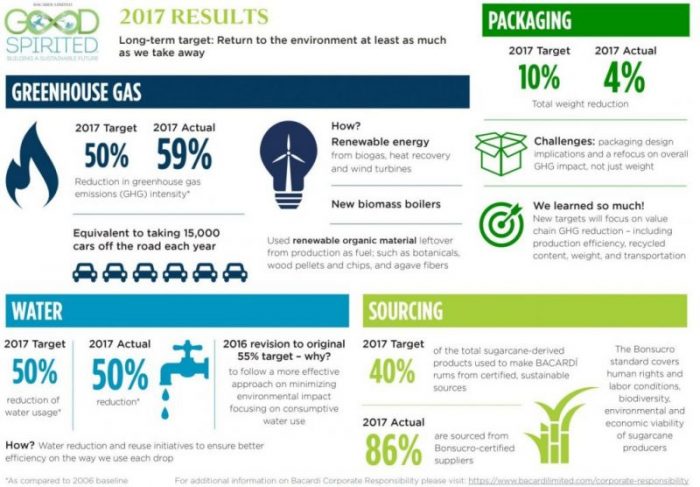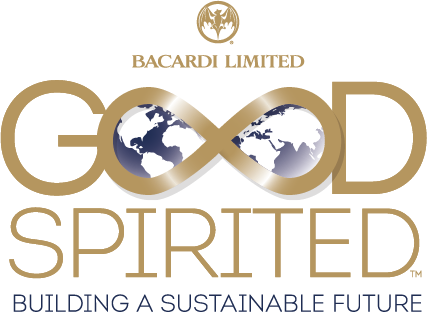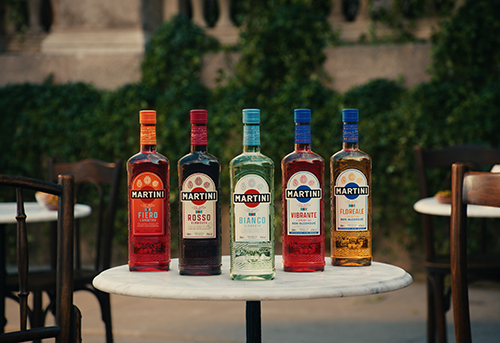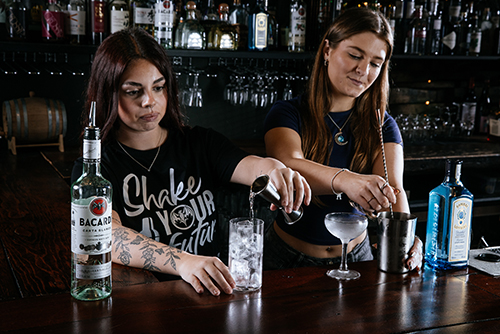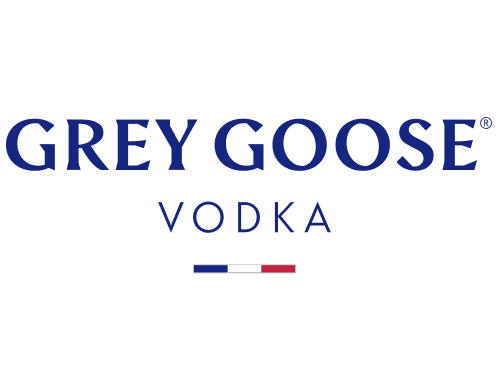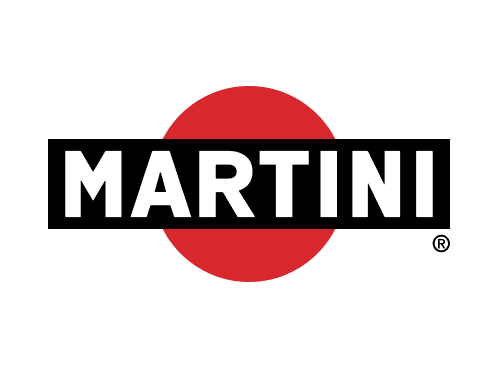Bacardi Limited Aligns Corporate Responsibility Strategy to Include UN Sustainable Development Goals
Bacardi Limited Aligns Corporate Responsibility Strategy to Include UN Sustainable Development Goals
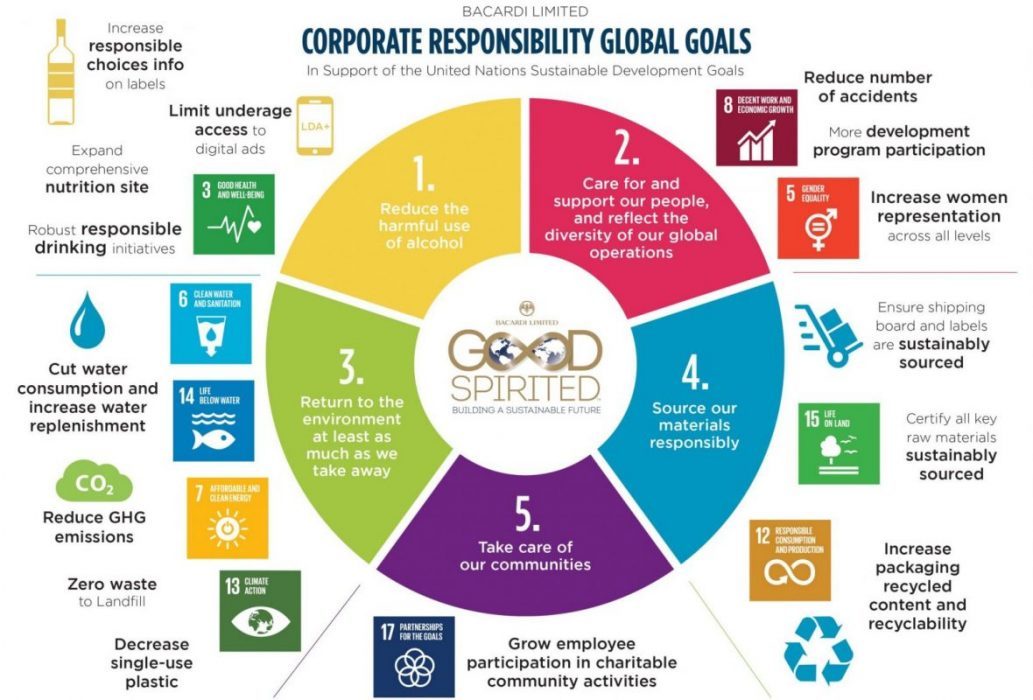
Bacardi Limited Aligns Corporate Responsibility Strategy to Include UN Sustainable Development Goals
September 5, 2018
Reporting of environmental achievements show significant reductions in water usage, greenhouse gas emissions intensity, and waste
Hamilton, Bermuda, September 5, 2018—Bacardi Limited, the largest privately held spirits company in the world, today announced the compilation of results of its environmental sustainability goals made in 2014 and expanded its “Good Spirited: Building a Sustainable Future” environmental initiative to now encompass the company’s entire Corporate Responsibility (CR) platform.
With the expansion, the Good Spirited platform now comprises Marketplace, which includes responsible marketing and responsible drinking, Philanthropy & Community Investment, People, as well as the initial focus areas of Responsible Sourcing and Environment. This commitment aligns family-owned Bacardi’s CR platform with most of the United Nations Sustainable Development Goals (SDGs).
Announced in early 2014, Good Spirited was an ambitious environmental sustainability initiative with specific goals in sourcing, packaging, and operations to be achieved by 2017 and 2022 — under the vision to return to the environment at least as much as we take away. Significant reductions have been achieved in greenhouse gas emission (GHG) intensity (59%) and water usage (50%), as well as Zero Waste to Landfill targets. In addition, the original sourcing goal to obtain 40% of sustainably sourced sugarcane-derived products used to make BACARDĺ® rums were not only achieved but more than doubled.
“Every Bacardi employee should take pride in what we have achieved to make the world a better, more sustainable place,” adds Jean-Marc Lambert, senior vice president – Global Operations, for Bacardi. “While we are pleased with our almost 60% reduction in GHG intensity and 50% reduction in water usage, we’re not stopping here—we’re working to achieve a net-zero impact throughout the value chain of our world-class brands. Our goal remains to return to the environment at least as much as we take away.”
Environmental Sustainability Achievements
Key achievements include:
- GHG Emissions: Bacardi cut GHG intensity from manufacturing operations in half more than a year earlier than its 2017 target. At the end of December 2017, the reduction was at 59%, compared to 2006 baseline. This reduction is equivalent to taking 15,000 cars off the road each year or reducing oil use by 165,000 barrels annually. Hundreds of initiatives implemented globally at Bacardi distilleries, bottling lines, visitor centers, and offices for energy reduction were part of achieving this reduction. Among the many energy-focused initiatives, Bacardi focused on renewable energy from biogas, heat recovery systems, and wind turbines. Additionally, new biomass boilers installed at the Tequila CAZADORES® facility in Mexico and ABERFELDY® and ROYAL BRACKLA® Scotch whisky distilleries in Scotland reduced the amount of fuel needed for reliable, cleaner energy. Instead of oil, renewable organic material such as botanicals, wood pellets, wood chips, and agave fibers leftover from production was used as fuel for the biomass boilers. Green electricity — including hydro, solar, and wind — contracts in the United Kingdom, Italy, and Germany were also important tools to reduce the carbon footprint.
- Water Usage: The 50% reduction of water use target by the end of December 2017 compared to the 2006 baseline was achieved. A combined effort by more than 25 manufacturing sites was fundamental to reach this milestone. From water reduction initiatives to water reuse, projects were implemented across operations to ensure better efficiency on the way each drop is used. (Note: a revision was made in 2016 from 55% to 50% to focus on the more environmentally effective “consumptive” water use reduction, which measures water that is not returned to the original water source.)
- Waste: A target of achieving Zero Waste to Landfill from manufacturing sites by 2022 was also set in 2014. As of the end of December 2017, 99.8% of the waste generated from Bacardi operations was diverted from landfills (only 0.2% sent to landfill), with one-third of sites already achieving Zero Waste to Landfill status. Further initiatives focusing on reduction, reuse, and recycling are in place for the remaining sites to achieve this status by 2022.
- Packaging:Despite efforts to reduce GHG through glass weight reduction, Bacardi was not able to meet the 10% packaging reduction goal between 2008 and 2017. As of the end of December 2017, the reduction was at 4%. This missed target was mainly driven by two factors: new packaging design implications and a refocus to overall GHG impact instead of only weight reduction. For example, Bacardi identified contributors to GHG beyond glass weight, including furnace efficiency and transportation logistics. This learning has been key in developing new goals that focus on supplier collaboration and glass weight reduction, includingproduction efficiency, recycled content, weight, and transportation.
- Sourcing:Sugarcane-derived products are the most significant agricultural supply, and Bacardi works with suppliers and industry groups to ensure all suppliers achieve certification to the Bonsucro standard covering human rights and labor conditions, biodiversity, environmental, and economic viability of sugarcane producers. As of the end of 2017, 86.3% of sugarcane-derived products used to make BACARDÍ rums were sourced from Bonsucro-certified suppliers, well ahead of the original 2017 target of 40%.
Moving Forward
Building on these achievements, Bacardi is evolving its strategy by committing to new, more encompassing Good Spirited goals globally, aligning with relevant UN Sustainable Development Goals (SDGs) and reinforcing the impact the private sector can make, often through partnerships, on many of the goals. These new global goals will progress to support future corporate and commercial strategies.
5 Global Goals Align with 10 SDGs
To support 10 of the UN SDGs that Bacardi can impact, the company has set five new goals with multiple corresponding targets with an end date of 2025. The new Good Spirited global goals build on past successes and look holistically at the value chain. When setting these goals, Bacardi looked to international standards and benchmarks to ensure the targets were ambitious and meaningful.
- Support the global strategy to reduce the harmful use of alcohol (UN SDG #3)
- Increase support of responsible drinking initiatives and partnerships in the top 80% of Bacardi markets
- Carry responsible drinking messaging and website designation on 100% of brand labels
- Make available to the consumer nutrition information for all brands
- Lead efforts, along with other industry members and partners, to put in place measures and standards to ensure digital marketing messages are targeted to adults of legal drinking age only
- Care for and support our people, and reflect the diversity of our global operations (UN SDGs #5, #8)
- Less than one Lost Time Accident per 1,000,000 worked hours (previously set to achieve by 2023)
- Support equal opportunity and leadership for women at all levels by having at least 45% of a female workforce and an increase in women in leadership positions
- 90% of employees participate in training and development programs
- Return to the environment at least as much as we take away (UN SDGs #6, #7, #12, #13, #14)
- 25% reduction of water consumed (focusing on water not returned to original source) at our operations*
- 50% replenishment of water incorporated into final product*
- Reduce absolute Scope 1 & 2 GHG emissions 50% and reduce absolute value chain GHG emissions (scopes 1, 2 and 3) 20% (approved by Science Based Targets)*
- Zero Waste to Landfill at all manufacturing sites (previously set to achieve by 2022)
- Eliminate one billion single-use plastic straws in collaboration with others (by 2020)
- Analyze and develop single-use plastic reduction across operations and supply chain
*As compared to 2015 baseline (using earliest reliable data available)
- Source our materials responsibly (UN SDGs #8, #12, #15)
- 100% of key raw materials sourced from sustainably-certified suppliers
- 100% paper and board used for shipping and labels sustainably certified
- 100% of product packaging to be recyclable
- 40% recycled content of product packaging materials
- Take care of our communities (UN SDG #17)
- 95% of Bacardi offices and manufacturing sites to participate in at least one CR employee engagement activity in partnership with local organizations
- 90% of employees to volunteer one work day to a personal cause or organization
“Since our founding in 1862, Bacardi has been built with a sense of being Fearless, with a Founders Mentality of running the business, coupled with Family and heritage at its core,” said Rick Wilson, senior vice president of Corporate Responsibility at Bacardi. “Moving forward, these values will guide our continued commitment to be a responsible business by empowering our employees to question, challenge, and innovate the way we work and always be Good Spirited. We want them to see the organization as if it was their own, to do what’s right for the business, take accountability for their work, and to treat each other and our communities like family.”
To read more about Corporate Responsibility within Bacardi, visit the Corporate Responsibility section at www.bacardilimited.com/ESG.
About Bacardi Limited
Bacardi Limited, the largest privately held spirits company in the world, produces and markets internationally recognized spirits and wines. The Bacardi brand portfolio comprises more than 200 brands and labels, including BACARDÍ® rum, GREY GOOSE® vodka, DEWAR’S® Blended Scotch whisky, BOMBAY SAPPHIRE® gin, MARTINI® vermouth and sparkling wines, PATRÓN® tequila, CAZADORES® 100% blue agave tequila, and other leading and emerging brands including WILLIAM LAWSON’S® Scotch whisky, ST-GERMAIN® elderflower liqueur, and ERISTOFF® vodka.
Founded more than 156 years ago, in Santiago de Cuba on February 4, 1862, family-owned Bacardi currently employs approximately 5,500, operates more than 20 production facilities, including bottling, distilling and manufacturing sites in 11 countries, and sells its brands in more than 170 countries. Bacardi Limited refers to the Bacardi group of companies, including Bacardi International Limited. Visit www.bacardilimited.com or follow @BacardiLimited.


